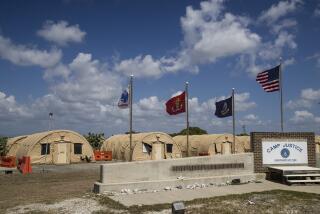Gitmo, meet Geneva
- Share via
GRUDGINGLY AND GRACELESSLY, the Bush administration has acknowledged that detainees in the war on terror are covered by a provision of the Geneva Convention prohibiting “humiliating and degrading treatment.” The change in policy -- and it is a change, despite official protestations that it won’t make any difference in the way prisoners are treated -- is doubly welcome. It brings the administration into compliance with the Supreme Court’s June 29 ruling that the Geneva Convention applies to detainees at Guantanamo Bay, and it begins to address the damage to the nation’s image caused by revelations of prisoner abuse both at Guantanamo and in Iraq.
Predictably, the administration minimized the importance of the new policy. It surfaced in a memo in which Deputy Defense Secretary Gordon England urged other officials to review their directives and regulations to ensure that they complied with Common Article 3 of the convention. On Tuesday, the White House issued a statement acknowledging that the Supreme Court ruling had nullified a Feb. 7, 2002, presidential order stating that the convention did not apply to Al Qaeda or Taliban detainees.
Yet even as it changed its policy, the administration suggested that nothing would change because detainees already were being treated in accordance with Article 3. If so, why was there a struggle within the administration over whether to cite that provision in a new interrogation manual for U.S. soldiers? And why the need for England’s memo?
The administration has wanted to have it both ways. It insisted that it was treating detainees humanely, while leaving the impression that the peculiar nature of this war requires harsher interrogation methods that stop just short of torture (defined in one Justice Department memo, later disavowed, as inflicting “severe physical or mental pain or suffering”). The best explanation for the mixed signals is that the administration wanted to preserve its options for interrogating prisoners who might be in possession of information that could prevent another terrorist attack -- the “ticking time bomb” scenario. But with the passage of time, that exigency has become less urgent.
Meanwhile, the administration’s refusal to recognize the constraints of the Geneva Convention made it appear that the U.S. lacked what the Declaration of Independence called “a decent respect [for] the opinions of mankind.” Better late then never, the administration has moved to correct that impression.
More to Read
Sign up for Essential California
The most important California stories and recommendations in your inbox every morning.
You may occasionally receive promotional content from the Los Angeles Times.












